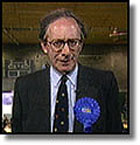
|
Devolution "Probably Won't End Union"The former Foreign Secretary, Malcolm Rifkind, has admitted that home rule for Scotland would probably not lead to the break-up of the United Kingdom.Mr Rifkind told The Scotsman newspaper that he "believes there is a risk" that devolution could lead to the fragmentation of the United Kingdom. "But I also believe the innate good sense of the Scottish and the English, a determination to persevere in the UK, means that it is highly probable the UK will survive," he added. His views seem to be a considerable softening of the Tory position. During the general election the Conservatives warned that devolution for Scotland threatened the break-up of the union. Mr Rifkind, who lost his Edinburgh Pentlands seat in the general election landslide which saw the Tories swept away in Scotland, told the newspaper that he would not lead a "No" campaign in Scotland in the autumn referendum on the devolution issue. The former Foreign Secretary, who was a supporter of Scottish home rule in the 1960s and 1970s, said a future Conservative government should not scrap any Scottish parliament. "If parliament and a referendum both endorse a Scottish assembly which was set up, I cannot conceive it likely that in the foreseeable future anybody would reverse that decision," he told the newspaper. "The assumption has to be if an assembly is established it will be there for the rest of your lifetime as well as mine," he said. The Scottish Office devolution minister Henry McLeish welcomed Mr Rifkind's views. "This is a welcome change of heart on the part of a very senior player in the Conservative Party," he said. "Our view is that our devolution proposals will strengthen the UK, and it's quite obvious that Malcolm Rifkind does not believe the apocalyptic tales that emanated from the Conservative Party during the general election," added Mr McLeigh. The Scottish National Party leader, Alex Salmond, said Tory disarray on the constitution was encapsulated in Mr Rifkind's "confused and endlessly shifting position". "Malcolm Rifkind has held just about every possible view on the constitution - except support for independence," said Mr Salmond. "In the 1970s, he was pro-devolution. But he changed his tune when he was appointed to Thatcher's front bench in the 1980s." "And before the recent General Election, Rifkind argued that devolution would lead to independence. But now he isn't so sure," added Mr Salmond added.
|
Diana, Princess of Wales, 1961-1997
Conference 97
Devolution
The Archive
News |
Issues |
Background |
Parties |
Analysis |
TV/Radio/Web
Interactive |
Forum |
Live |
About This Site
News |
Issues |
Background |
Parties |
Analysis |
TV/Radio/Web
Interactive |
Forum |
Live |
About This Site
© BBC 1997 |
politics97@bbc.co.uk |
